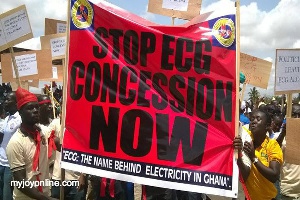The Africa Centre for Energy Policy (ACEP) has urged the government of Ghana to pursue its agenda of introducing reforms to the management of the Electricity Company of Ghana (ECG) to make it more efficient.
In a statement, ACEP stressed the importance of private sector participation and urged government "not to reverse its pursuit of the reforms in ECG to ensure quality service delivery to consumers. We, however, encourage the government to do this with deeper consultations involving the workers, civil society, and other relevant stakeholders.”
The statement signed and released by Executive Director, Dr Mohammed Amin Adam on Wednesday September 7 said the disgruntled workers of ECG have legitimate issues which need attention and cautioned against sidelining their welfare.
Government intends to give the company to a concessionaire for 25 years, a decision which has led to a series of protests and lawsuits. The workers hold the opinion that a change in management will lead to lay-offs with the leadership suggesting other alternatives to improve the company.
ACEP has, therefore, proposed that “government must consider other forms of privatisation, particularly a transfer of majority ownership of shares (at least 51%) in ECG to a strategic partner selected through an open and competitive process or offload the shares to be acquired through the Ghana Stock Exchange”.
ACEP also charged workers to desist from their demonstrations which have resulted in inconveniences for industrial, commercial and residential consumers.
Below is the full statement:
GOVERNMENT MUST CONTINUE WITH ECG REFORMS TO SAVE THE COMPANY - ACEP
The Africa Centre for Energy Policy (ACEP) has noted with worry the effect of the strike by Electricity Company of Ghana (ECG) workers on consumers of electricity. Since the declaration of the strike, consumers have gone through various forms of frustration to access services from ECG.
We find this unacceptable considering the effects of several years of erratic power supply already suffered by industrial, commercial and residential consumers. ACEP has been following the discussions about the future of the electricity distribution company, and in particular the decision by the government to put the company under a concession for 25 years, which led to the strike by ECG workers. We are of the view that the reasons for the decision to put the company on concession are not in doubt.
It is well known that ECG has not provided satisfactory services to consumers of electricity over the years. We also know that government interference in the company concerning appointments to the Board and management as well as its indebtedness to the company are partly to blame for the current state of the company.
Whilst these issues must be addressed, the choice of a model has been challenging. From our engagement with stakeholders including the workers of ECG, there appears to be consensus that ECG indeed needs reforms through private sector participation. Where there is no consensus is the form for privatization should take.
We propose that if the workers are opposed to the concession option, government must consider other forms of privatization particularly a transfer of majority ownership of share (at least 51%) in ECG to a strategic partner selected through an open and competitive process or offload the shares to be acquired through the Ghana Stock Exchange. It is important to note that the leadership of the workers has already expressed its support for the stock exchange option.
This shows that we can make progress on privatization of the company if the government adopts our proposal. ACEP wishes to state that the reforms in ECG must be aimed at eliminating government interference, raising capital for the company and introducing new business processes and culture to address the level of inefficiencies and financial challenges of the company.
These objectives have proven elusive under the current management system in ECG. We therefore urge government not to reverse its pursuit of the reforms in ECG to ensure quality service delivery to consumers. We however encourage the government to do this with deeper consultations involving the workers, civil society and other relevant stakeholders. We also wish to draw attention to some of the concerns expressed by the workers. 1. Job security - The concerns of workers about job security should be addressed but this should not be used to shield workers who cannot live up to expectations. Job security must go side-by-side with responsibility. Government as part of the reforms process must conduct job evaluation of the workers to identify those who deserve to work in the company.
2. ECG debts - We are aware that government under the MCC II has committed to a plan to liquidate its share of the debts of ECG over 5 years. Government must not fail in delivering on this commitment as that could support the liquidity position of the company.
Finally, we wish to appeal to the workers to consider the impact of their action on consumers who have not been served well by ECG over the years; and to review their actions to give way to genuine consultations.
……..Signed……. Dr Mohammed Amin Adam Executive Director
Business News of Wednesday, 7 September 2016
Source: classfmonline.com













